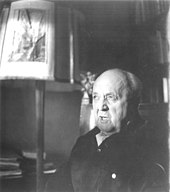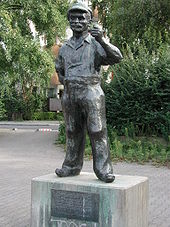Alfred Braun


Alfred Braun (born May 3, 1888 in Berlin ; † January 3, 1978 ibid) was a pioneer of German broadcasting . Braun became famous as a radio reporter and radio play director , among other things . He was also an actor , a director of stage, film and screenwriter .
Life
Alfred Braun grew up in proletarian Berlin NO , later he called himself a "boy from Prenzlauer Berg ". He broke off the higher education made possible with a gifted scholarship at the age of 17 in favor of his passion for the theater. He became a student of Max Reinhardt and in 1907 received his first engagement as an actor at the Berlin Schiller Theater . During the First World War , Braun was the only breadwinner of his family to be released from military service. From November 1924 he started working for the radio, first as a speaker and later as director of Funk-Hour Berlin , Germany's first radio station . In the history of broadcasting received Brauns live reports from the funeral of Foreign Minister Gustav Stresemann (6 October 1929) and the award of the Nobel Prize for Literature to Thomas Mann (10 December 1929), as well as the production of SOS ... rao rao ... Foyn , the oldest completely preserved radio play in German. This production by Alfred Braun was kept in the German Broadcasting Archive (DRA) and was released as an audio CD by DRA's own publishing house at the end of 2013.
Until 1933 he was head of the acting department of the Funk-Hour Berlin. Again and again he took on film roles himself. The social democrat Braun was one of the most popular figures of the Weimar Republic. When the National Socialists came to power in 1933, Braun's activity ended. The Gestapo arrested Braun in August 1933 on charges of being a main representative of the “Weimarer Systemrundfunks” responsible for “Judging the radio hours” and took him to the Oranienburg concentration camp for six weeks , then to the Berlin-Moabit remand prison . An indictment by Braun in the planned "Reichs-Rundfunk-Trial" held in autumn 1934 did not result.
At the end of September 1933, the prominent Swiss theater maker Ferdinand Rieser Braun's release, which involved emigrating to Switzerland. Rieser initially engaged him in 1933 at the Schauspielhaus Zurich . Afterwards Braun was an actor and director at the Stadttheater Basel from 1935 to the end of 1937 . After Joseph Goebbels rejected his application for rehabilitation and re-employment with the Berliner Rundfunk , Carl Ebert found him the position of rhetoric teacher at the theater and opera department of the Turkish National Academy in Ankara . When war broke out, Braun returned to Berlin in 1939 and became, initially anonymously, war correspondent , then screenwriter. The German Stage Yearbook 1940 mentions Alfred Braun as acting head of Production I - Current Affairs at the German Television Broadcasting Corporation , Kaiserdamm 77. Under Veit Harlan , Braun was assistant director in 1940 for his anti-Semitic inflammatory film Jud Suess , in 1941 he acted as spokesman for the aviation commercials Himmelsstürmer and then wrote for Harlan wrote the scripts for the films The Golden City , Sacrifice , Immensee and Kolberg .
Before the end of the war, Braun had retired to Stuttgart, where he had acquired a small property in 1943. In the post-war period he worked there from 1945 to 1947 for the American occupation forces on the radio. Requested by the Soviet occupation forces as an " anti-fascist ", Braun returned to Berlin-Prenzlauer Berg in 1947 to become a commentator on the communist Berlin radio , where he carried out anti-American propaganda. He ended this activity in 1949. He then enjoyed success as a radio play director and film director in West Germany and West Berlin , including in 1953 with the Zarah Leander film Ave Maria . His productions had a very emotional character, as was often the case in German films of the 1950s. In the biography Stresemann , Braun devoted himself again to the Reich Foreign Minister Gustav Stresemann.
Regardless of his commitment to the National Socialists and then to the Communists, Braun became director of the newly founded Sender Free Berlin in West Berlin in 1954 , then program director from 1957 to 1958 and directed several films at the same time.
Alfred Braun died in Berlin in early 1978 at the age of 89. His grave is in the state-owned cemetery Heerstraße in Berlin-Westend . By resolution of the Berlin Senate , the last resting place of Alfred Braun (field 18-K-102) has been dedicated to the State of Berlin as an honorary grave since 1990 . The dedication was extended in 2016 by the usual period of twenty years.
His daughter is the actress Etta Braun (* 1928).
Works
Audio documents
- Voices of the 20th Century: The Sound of the Twenties. Prod .: DHM / DRA, 2004. (The audio CD contains Braun's radio reports from 1929.)
- William Shakespeare : Romeo and Juliet with Klaus Kinski . Director: Alfred Braun. Prod .: Berliner Rundfunk, 1949.
Filmography
- 1912: Jugendstürme - An officer's novel (actor)
- 1916: The Sorrow of Love (actor)
- 1919: The maid's son (actor)
- 1920: The Players (Actors)
- 1924: The sunny fairy tale of happiness (actor)
- 1924: The Bacchante (actor)
- 1924: Shrove Monday (actor)
- 1927: Funkzauber (actor)
- 1930: Tingel-Tangel (actor)
- 1930: Flax man as educator (actor)
- 1931: Then I prefer cod liver oil (actor)
- 1932: Spies in the Savoy Hotel (actor)
- 1940: Jud Süß (assistant director)
- 1941: The Golden City (co-script)
- 1943: Immensee (co-script)
- 1943: sacrifice (co-script)
- 1943: Great Freedom No. 7 (actor)
- 1944: Eyes of Love (Between Night and Morning) (Director and co-screenplay, first performance: 1951)
- 1945: Kolberg (co-script)
- 1945: The Puppeteer (director and co-screenplay, unfinished)
- 1948: Chemistry and Love (actor)
- 1949: Anonymous letters (actors)
- 1949: Girl Behind Bars (Director)
- 1950: The stairs (director and actor)
- 1950: A Rare Mistress / Piquancy (Director)
- 1951: Primanerinnen (actors)
- 1951: When the evening bells ring (director and actor)
- 1952: A Thousand Red Roses Bloom (Director)
- 1953: Ave Maria (director and actor)
- 1953: Come back ... (Director)
- 1956: Stresemann (director)
- 1958: Black Nylons - Hot Nights (Director)
- 1959: Tomorrow You Will Cry For Me (Director)
- 1963: Scotland Yard chases Dr. Mabuse (actor)
- 1967: the death of a doppelganger (idea)
Radio plays
- 1925: Friedrich Schiller : Wallenstein's camp - adaptation and direction (Funk-Hour Berlin), January 3, 1925
- 1926: Christian Dietrich Grabbe : Duke Theodor von Gothland editing; Klabund , composition: Kurt Weill , co-arranger and director (Funk-Hour Berlin), September 1st
- 1927: Bertolt Brecht : man is man , with Ernst Legal - director (Funk-Hour Berlin)
- 1927: Walter Mehring : Sahara - A Journey in Audio Pictures , with Walter Mehring, - Director (Funk-Hour Berlin), September 24th
- 1927: William Shakespeare : Macbeth , arrangement: Bertolt Brecht - co-arranger and director (Funk-Hour Berlin)
- 1929: Friedrich Wolf : SOS… rao rao… Foyn - "Krassin" saves "Italia" - Director: Alfred Braun (radio play - RRG )
- 1931: William Shakespeare: Hamlet , arrangement: Bertolt Brecht, composition: Walter Gronostay - director (Funk-Hour Berlin)
- 1932: Bertolt Brecht: Saint Joan of the Schlachthöfe , Co-Director: Bertolt Brecht - Director (Funk-Hour Berlin)
- 1947: Friedrich Karl Kaul : One of Many - Director ( Berliner Rundfunk )
- 1947: Bernhard Zebrowski : Farewell to Shanghai (speaker) - Director: Hannes Küpper (Berliner Rundfunk)
- 1947: Hans Sattler : The Way Out of Darkness - Director (Berliner Rundfunk)
- 1948: Friedrich Karl Kaul: On the Barricades - Director (Berliner Rundfunk)
- 1948: George Bernard Shaw : The Emperor of America - Director (Berliner Rundfunk)
- 1948: Stralauer Fischzug (also author and speaker) - director (Berliner Rundfunk)
- 1949: William Shakespeare : Romeo and Juliet (prologue speaker) - director (Berliner Rundfunk)
- 1949: George Bernard Shaw: Saint Johanna - Direction (Berliner Rundfunk)
Honor
On the Iburger Ufer directly on the Spree in the district of Berlin-Charlottenburg there is a memorial called Der Spreekieker , which was created by the artist Gertrud Bergmann and honors the “first broadcaster” in Germany. The name of the monument is reminiscent of a report broadcast every 14 days from 1962 onwards by Alfred Braun at the SFB , the texts of which he also published in book form in 1965.
literature
- Alfred Braun: Attention, attention, this is Berlin! From the history of German broadcasting in Berlin 1923–1932, Haude and Spenersche Verlagbuchhandlung Berlin, 1968
- Thomas Blubacher : Alfred Braun . In: Andreas Kotte (Ed.): Theater Lexikon der Schweiz . Volume 1, Chronos, Zurich 2005, ISBN 3-0340-0715-9 , p. 262.
- Steffen Jenter: Alfred Braun - radio pioneer and reporter in Berlin . Verlag für Berlin Brandenburg Potsdam 1998, ISBN 3-932981-26-X .
- Julia Pietsch: Alfred Braun (1888–1978). In: Siegfried Mielke , Stefan Heinz (eds.) With the collaboration of Julia Pietsch: Trade unionists in the Oranienburg and Sachsenhausen concentration camps. Biographical manual . Volume 4 (= trade unionists under National Socialism. Persecution - Resistance - Emigration , Volume 6). Metropol, Berlin 2013, ISBN 978-3-86331-148-3 , pp. 102-118.
- Kay Less : Between the stage and the barracks. Lexicon of persecuted theater, film and music artists from 1933 to 1945 . With a foreword by Paul Spiegel . Metropol, Berlin 2008, ISBN 978-3-938690-10-9 , p. 428 f.
- Kay Less: 'In life, more is taken from you than given ...'. Lexicon of filmmakers who emigrated from Germany and Austria between 1933 and 1945. A general overview. ACABUS-Verlag, Hamburg 2011, ISBN 978-3-86282-049-8 , p. 626 f.
- Reiner Möckelmann : Ankara waiting room. Ernst Reuter - exile and return to Berlin. Berliner Wissenschaftsverlag, 2013, ISBN 978-3-8305-3143-2 , pp. 130–132.
Web links
- Alfred Braun in the Internet Movie Database (English)
- Original radio report with Alfred Braun from Vienna (March 28, 1931).
Individual evidence
- ↑ Deutsches Bühnenjahrbuch 1940, 51st year, publisher: The President of the Reichstheaterkammer Berlin, page 658.
- ^ Hans-Jürgen Mende : Lexicon of Berlin burial places . Pharus-Plan, Berlin 2018, ISBN 978-3-86514-206-1 . P. 484.
- ↑ Honorary graves of the State of Berlin (as of November 2018) . (PDF, 413 kB) Senate Department for the Environment, Transport and Climate Protection, p. 10; accessed on November 8, 2019. Recognition and further preservation of graves as honorary graves of the State of Berlin . (PDF, 205 kB) Berlin House of Representatives, printed matter 17/3105 of July 13, 2016, p. 1 and Annex 2, p. 1; accessed on November 8, 2019.
- ↑ Alfred Brown: The Spree Kieker f, Lettner Verlag, Berlin 1965, information about the program in the Introduction, p. 5
| personal data | |
|---|---|
| SURNAME | Braun, Alfred |
| BRIEF DESCRIPTION | German radio reporter and radio play director |
| DATE OF BIRTH | May 3, 1888 |
| PLACE OF BIRTH | Berlin |
| DATE OF DEATH | January 3, 1978 |
| Place of death | Berlin |


